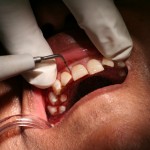
Periodontal disease has been associated with a broad range of systemic diseases with the relationship between diabetes and periodontitis being one of the most extensively researched. Biological models support the possibility of a bidirectional relationship and a recent Cochrane review (Dental Elf – 11th Nov 2015) found low evidence that periodontal treatment improved glycaemic control at 3-4 months.
The aim of this trial was to assess whether periodontal treatment can lead to clinical, glycaemic control and quality of life improvements in metabolically unbalanced diabetic patients (type 1 or type 2) diagnosed with periodontitis.
Methods
This was a two -centre prospective open-labelled, randomized controlled clinical trial (RCT). The treatment group received immediate periodontal treatment while the controlled group had delayed treatment. Follow up took place after 3 months.
Patients were included who were diagnosed with diabetes mellitus (type 1 or type 2) at least 1 year before the date of inclusion, were uncontrolled on the date of inclusion and with their diabetes treatment unchanged over the previous 3 month and had at least six permanent natural teeth and a diagnosis of periodontitis attested by the presence of at least four teeth with at least one probed site with a periodontal pocket depth (PPD) ≥4 mm and a clinical attachment level (CAL) ≥3 mm.
Periodontal treatment included non-surgical scaling and root planing (SRP), systemic antibiotics (amoxicillin 2 g/day for 7 days after periodontal treatment) and providing a supply of oral hygiene products and oral health instructions. The control group received the same periodontal treatment after a delay of 3 months. The primary outcome of the DIAPERIO trial was the change in HbA1C and fructosamine levels. The General Oral Health Assessment Index (GOHAI) and the SF-36 index were used to assess quality of life (QoL). All adverse health events during the 3-month follow-up period were recorded
Results
- 180 patients were screened with 91 being randomised 46 to control (35 type 1 ,11 type 2 ) and 45 to the test group (32 type 1,13 type 2).
- 3 patients (2 in control, 1 in test) were lost to follow up.
- Periodontal health significantly improved after periodontal treatment (p < 0.001) for both type 1 and type 2 diabetes
- Mean PPD; adjusted mean difference (aMD) = −0.32 mm (95%CI; −0.43; −0.21).
- Mean CAL; aMD = −0.27 mm (95%CI; −0.44; −0.09).
- % BoP sites; aMD = −13.6% (95%CI; −19.2; −8.0).
- Periodontal treatment seemed to be safe but had no significant effects on
- Glycaemic control based on HbA1C ; aMD = 0.04 (95%CI; -0.16; 0.24) or
- Fructosamine levels; aMD= 5.0 95%CI; -10.2; 20.2).
- There was no obvious evidence of improvement in general QoL after periodontal treatment.
- There was significant improvement in oral health-related QoL; aMD = 7.0 (95%CI; 2.4; 11.6)
Conclusions
The authors concluded: –
Although we cannot affirm that periodontal treatment has no effect on glycaemic control, regardless of the type of diabetes considered, it is likely that this effect is modest at best. In any event, periodontal treatment reduces oral inflammation, is safe, improves the oral health-related QoL of diabetic patients and might have an effect on overall QoL. Therefore, referral to a dentist is essential and should be an integral part of diabetes management
Comments
The Cochrane review on periodontal treatment for glycaemic control in diabetic patients was last updated in 2015 (Dental Elf – 11th Nov 2015). That review included 35 RCTs providing low quality evidence that periodontal treatment improved glycaemic control at 3-4 months. The Cochrane reviewers suggested that larger, well-conducted and clearly reported studies were needed as well as studies investigating adjunctive drug therapies. The authors had estimated that they needed 150 patients (75 per arm) and only 91 were randomised so the study may be underpowered. The authors also highlight that the study sample may not be representative of uncontrolled diabetics and that the levels of periodontal disease in the patients was at the less severe end of the spectrum. While this study does not support a relationship between periodontal treatment and diabetes carrying out periodontal treatment reduces oral inflammation, is safe and improves the oral health-related quality of life so should be undertaken for diabetics as for other patients.
Links
Primary Paper
Vergnes JN, Canceill T, Vinel A, Laurencin-Dalicieux S, Maupas-Schwalm F, Blasco-Baqué V, Hanaire H, Arrivé E, Rigalleau V, Nabet C, Sixou M, Gourdy P, Monsarrat P; DIAPERIO Group. The effects of periodontal treatment on diabetic patients: The DIAPERIO randomized controlled trial. J Clin Periodontol. 2018 Oct;45(10):1150-1163. doi: 10.1111/jcpe.13003. Epub 2018 Sep 14. PubMed PMID:30136741.
Other references
Dental Elf – 11th Nov 2015
